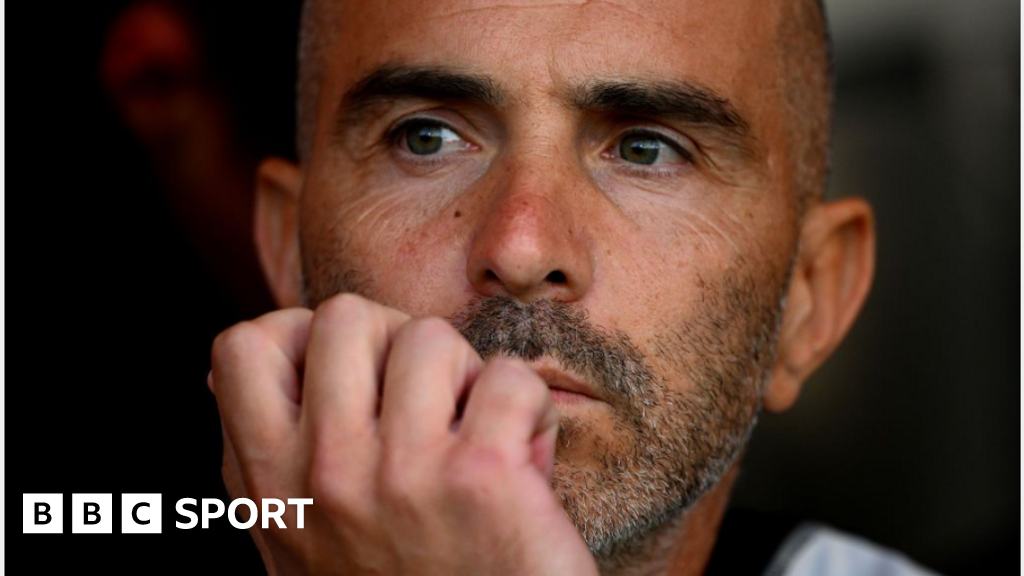Just weeks after guiding Leicester City back to the Premier League, the Italian has quit after one season and opted to take on what many see as a poisoned chalice.
The 44-year-old will become the fifth Blues boss since the start of 2022-23, and a seventh permanent boss in five years.
His predecessor Mauricio Pochettino lost his job – albeit by mutual consent – at the end of the season despite guiding Chelsea to sixth in the Premier League, back into European football and to a domestic cup final.
So, why has Maresca turned his back on the Foxes for a club who splashed an incredible £747m on transfers during the 2022-23 campaign and have lurched from crisis to crisis in the recent past?
Image source, Getty Images
Issues looming for the Foxes
As genuine as Maresca’s joy was at taking Leicester City straight back to the top flight at the first time of asking, the euphoria created by promotion could not disguise the fact that not everything was well at the club.
Leicester’s possible Financial Fair Play (FFP) issues were something he only became aware of after the season had started.
That, coupled with a highly unsatisfactory January transfer window involving two deals in particular, also created conflict at Leicester.
Cesare Casadei was very much part of Maresca’s plans after signing on loan – coincidentally, from Chelsea – at the start of the season. Then Chelsea recalled him in the winter window.
Stefano Sensi, from Inter Milan, had come to the UK to help complete the deal once the two clubs had negotiated a fee for the player. Suddenly everything fell apart over concerns surrounding the club’s FFP standing.
Maresca kept his counsel and soldiered on but to say he was unimpressed on both occasions would be an understatement.
But to say that disillusionment with the club is the defining reason for his swapping the blue of Leicester to that of Chelsea is wide of the mark.
Aiming for a top-four finish
The reality is that when you receive offers from two former Champions League-winning sides – Chelsea and Porto – your profile in a competitive market becomes clear. And it is clear too why Maresca has been chosen to make improvements at a potentially top club like Chelsea.
That is probably being a bit unfair to Pochettino, because he has left the club in a considerably better, far more stable place than he found it 12 months ago.
Pochettino, though, is the type of coach who has to believe he is in the right place, where he feels respected as he co-exists in an atmosphere of happiness and harmony – and he felt none of those things at Stamford Bridge.
Ironically, Maresca is also that kind of manager, someone who needs to feel empathy and the understanding of his paymasters.
Bearing that in mind, his main worry about accepting the job will be taking on board Pochettino’s reasons for leaving, namely the excessive interference and influence exerted by the owners, which many believe hampers the work done by the coaches.
He could have called Pochettino to ask for his input.
But Maresca has been told the right things, sent the right messages and been reassured that at Chelsea he will be supported and surrounded by enough elite people that can work alongside him, to guarantee the club can achieve their first major aim of a top-four finish.
What will he find at Chelsea?
He will find a young team, one disappointed with the departure of Pochettino, who many felt was just starting to get it right.
But he shouldn’t have too much of a problem selling his type of game to his new players, a style which isn’t dissimilar from Pochettino’s: high tempo, pressure high up the pitch, possession.
This time – with the greatest respect to the Leicester squad – he will be able to apply it with players better than the ones he had at King Power Stadium.
To do that, he will have to stamp his authority and continue the progress in the culture of the club started by Pochettino, not just within the camp but also with everyone around it as well, very much like he did at Leicester.
Maresca won’t initially be looking for a club that wins absolutely everything but rather one that gives him stability and allows him to put his ideology into practice.
For the majority of Leicester fans, there will be disappointment.
But Maresca, despite the title-winning euphoria, always believed the main aim for this Leicester side in the coming season would be avoiding relegation.
The Chelsea fans will take to him and to his style of play. They will find him an interesting guy, a man of depth who might come over a little reserved at the beginning but who will soon convince the fans.
His wife Maria and their four children will be happy to be staying in England, although they would have preferred to remain in Leicester, where they have settled very well.
When offers like this come in, though, they also know that they can’t really be turned down.
Ultimately, his decision to leave Leicester has nothing to do with the negativity he received from some of the fans in the past about the style of football.
Rather, it is because a club of a higher calibre has given him the chance to get close to the elite – where he belonged as a player and to where he quite rightly aspires to be as a coach.

